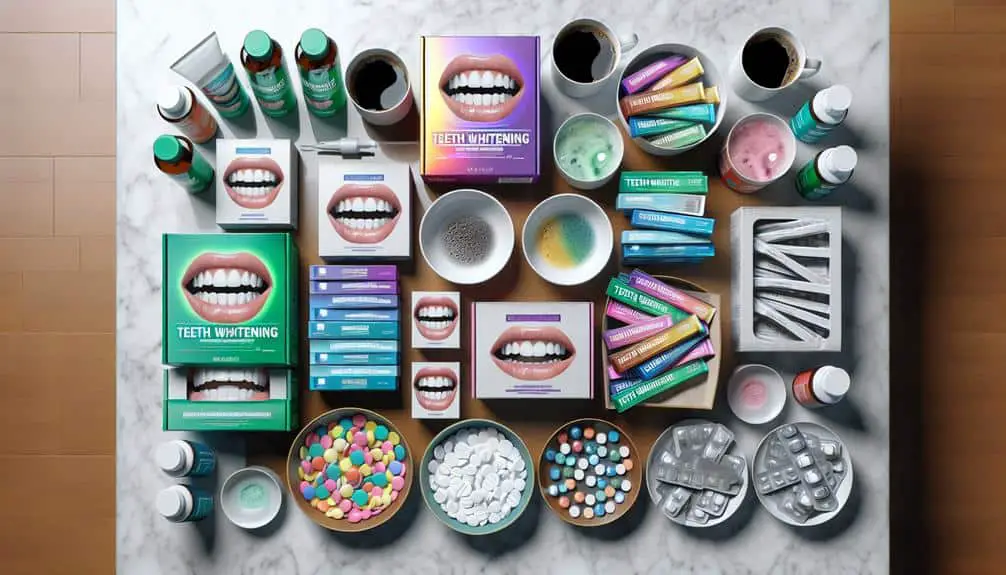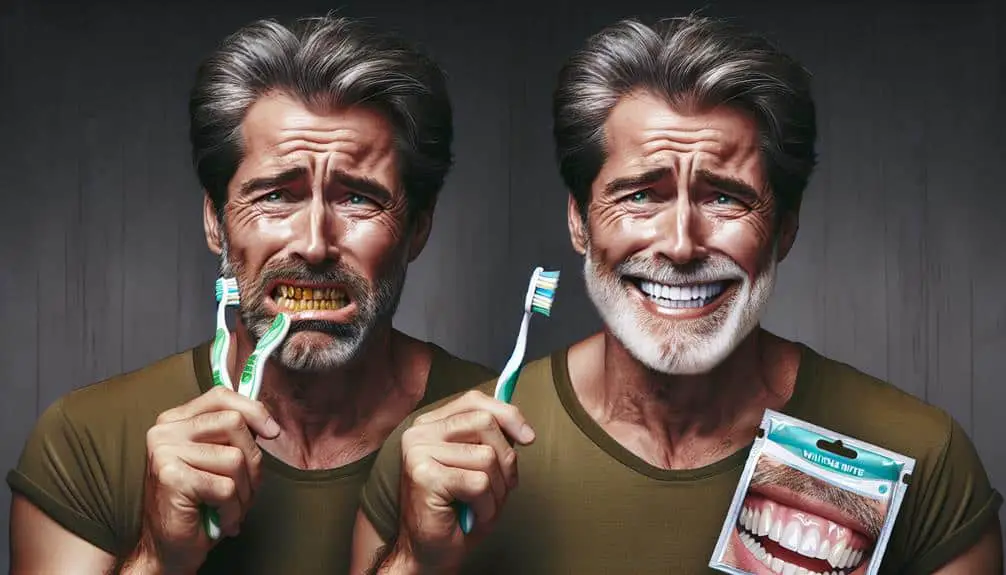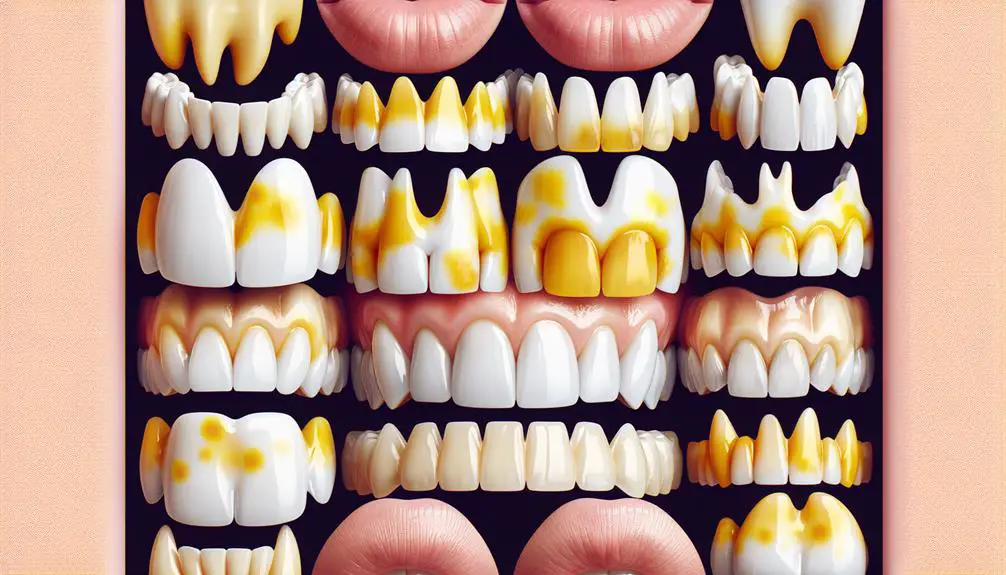Enhance your dental health post-medication stain treatment by using whitening products. These products break down stains effectively. Maintain brightness with whitening toothpaste and mouthwash. Mind your diet to avoid staining foods. Keep up with brushing and flossing routines. Visit your dentist regularly for check-ups and cleanings. Opt for a balanced diet rich in fruits, vegetables, lean proteins, and dairy. Include essential vitamins and minerals for oral health. Professional follow-up appointments are important for monitoring progress. Professional advice guarantees treatment effectiveness and personalized care. Find more useful tips for maintaining your radiant smile.
Key Points
- Use whitening products designed for medication stains to maintain brightness.
- Follow good oral hygiene practices like regular brushing and flossing.
- Be mindful of diet to prevent staining foods and beverages.
- Attend regular professional follow-up appointments for monitoring and advice.
- Incorporate balanced diet rich in essential nutrients for dental health.
Understanding Medication Stain Whitening Effects
When undergoing medication stain whitening treatment, it's important to understand how the process works to effectively address discoloration caused by medications.
Medications can cause stains on your teeth by altering the natural color of the enamel or affecting the development of teeth. To prevent further staining, it's essential to be aware of the types of medications that can lead to discoloration and take preventative measures.
Utilizing whitening products specifically designed for medication stains can help in restoring the natural color of your teeth. These products work by breaking down the stains and brightening the enamel, resulting in a whiter smile.
Regular use of whitening toothpaste or mouthwash can also aid in preventing new stains from forming. Understanding the effects of medication stains and how whitening products can combat them is vital for maintaining a bright and healthy smile.
Dental Care Tips for Whitened Teeth
To maintain the brightness of your whitened teeth post-medication stain treatment, it's essential to follow specific dental care tips. Preventing discoloration and ensuring long-term maintenance are important aspects of preserving your newly whitened smile.
First and foremost, be mindful of your diet. Avoid foods and beverages known to stain teeth, such as coffee, tea, red wine, and berries. If you do consume these items, consider rinsing your mouth with water afterward or brushing your teeth to minimize staining effects.
Additionally, maintain good oral hygiene practices by brushing your teeth at least twice a day and flossing daily. Use a whitening toothpaste recommended by your dentist to help maintain the whiteness of your teeth.
Regular dental check-ups and cleanings are also essential in preventing discoloration and ensuring your teeth stay bright for the long term. By incorporating these dental care tips into your daily routine, you can enjoy a radiant smile for years to come.
Maintaining Oral Hygiene Post-Treatment
Maintain ideal oral hygiene post-treatment by incorporating specific dental care practices into your daily routine. Proper brushing techniques are essential to preserving the results of medication stain treatment. Use a soft-bristled toothbrush and fluoride toothpaste to gently brush your teeth in circular motions, ensuring to cover all surfaces and corners of your mouth. Remember to brush for at least two minutes, twice a day, to effectively remove plaque and prevent staining.
In addition to brushing, establishing a consistent flossing routine is vital for maintaining oral hygiene. Flossing helps remove food particles and plaque from between teeth and along the gumline, areas that a toothbrush may not reach. Incorporate flossing into your daily routine, gently sliding the floss between each tooth, making a C-shape to hug the tooth and clean below the gumline. By combining proper brushing techniques and a thorough flossing routine, you can safeguard your dental health and sustain the benefits of medication stain treatment.
Diet Recommendations for Dental Health
Consider incorporating a balanced diet rich in fruits, vegetables, lean proteins, and dairy to support ideal dental health and complement your oral hygiene routine. Nutritional balance is important for maintaining strong teeth and gums. Fruits and vegetables provide essential vitamins and minerals that promote oral health, while lean proteins like chicken and fish help in tissue repair. Dairy products such as milk and cheese are rich in calcium, which is essential for strengthening teeth.
To further enhance your dental health, reducing sugar intake is essential. Sugars can lead to tooth decay and cavities by fueling harmful bacteria in the mouth. Opt for sugar-free alternatives and limit consumption of sugary drinks and snacks. Instead, choose whole foods that are low in added sugars to protect your teeth.
Professional Follow-Up Care Advice
For effective post-medication stain treatment care, regular professional follow-up appointments are highly recommended to monitor your dental health progress and address any concerns promptly. These follow-up appointments play an essential role in preventing discoloration and maintaining the results of your stain treatment. During these visits, your dentist will assess the condition of your teeth, check for any signs of staining recurrence, and provide personalized advice on how to best care for your teeth to avoid future discoloration.
Follow-up appointments also allow your dentist to track the effectiveness of the treatment provided, making any necessary adjustments to guarantee excellent results. Additionally, your dentist can offer further guidance on maintaining good oral hygiene practices, including recommendations for specific dental products that can help prevent discoloration and maintain the brightness of your teeth.
Frequently Asked Questions
Can Over-The-Counter Whitening Products Be Used in Conjunction With Medication Stain Whitening Treatments?
When you're balancing over-the-counter whitening products with medication stain treatments, consider the timing of consumption for best results. Validate product compatibility and explore sensitivity options to maintain whitening. Your dental health journey can benefit from this strategic approach.
How Long Should One Wait Before Consuming Staining Foods and Drinks After Medication Stain Whitening Treatment?
After medication stain whitening treatment, you should wait at least 24 hours before indulging in staining foods and drinks. This helps prevent new stains and allows your teeth to fully benefit from the treatment. Post-treatment diet is key for long-lasting results.
Are There Any Alternative Treatments for Medication Stain Whitening for Individuals With Sensitive Teeth?
To address tooth sensitivity, consider whitening alternatives like gentle formulas or professional treatments designed for sensitive teeth. Prioritize enamel protection by using desensitizing toothpaste and avoiding extreme temperatures to prevent sensitivity.
Can Medication Stain Whitening Treatments Affect Dental Fillings or Crowns?
Whitening treatments can impact dental fillings or crowns by possibly causing color discrepancies. It is crucial to consult your dentist before beginning any whitening procedure to confirm compatibility with existing dental work. Over-the-counter products may worsen these problems.
Are There Any Long-Term Effects on Oral Health From Undergoing Medication Stain Whitening Treatments Multiple Times?
Maintaining oral hygiene is vital post-medication stain whitening treatments. Be mindful of potential side effects and take necessary precautions. Regular dental check-ups, proper brushing, and flossing will aid in long-term oral health after multiple treatments.



